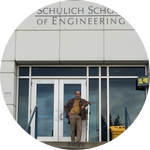About This Project
Biomass is organic matter that comes from plants or animal waste (leaves, cooking oil, sugar, etc.) that can be converted into biofuels by different chemical processes. The problem is that more effective catalysts are needed to develop new technologies that can compete with the oil driven market of petroleum products. I propose to synthesize molybdenum based nanoparticles and use them as a catalyst for biomass conversion.
Ask the Scientists
Join The DiscussionWhat is the context of this research?
Many reactions that convert biomass require the use of heterogeneous catalysts (catalysts that are in a different phase to that of the reactants). Currently, the catalysts normally used are not very active, lack stability and have poor selectivity towards the targeted reactions. This is where nano-catalysts come into play since they exhibit enhanced catalytic properties; the issue is that many of the known methods of synthesis have the disadvantage of using high temperatures, organic solvents, high pressures and complicated setups in order to achieve nano sizes of the desired materials. In addition, the control over the morphology of the final structure is sometimes hard to achieve which has a direct impact on catalytic behavior.
What is the significance of this project?
My research will try to form nanoparticles by synthesizing nanosized molybdenum precursors, converting them into the active phase, and encapsulating them to prevent growth. This method uses inexpensive precursor materials and lower temperatures, and could be extended to the preparation of nanocatalysts of many other active phases. The cost of production of catalysts required to push emerging technologies into the market will be reduced. The key factor is to have a catalyst with an enhanced activity, great selectivity and long-term stability as to be cost-effective that will considerably reduce energy input and environmental impact.
What are the goals of the project?
My goal is the successful synthesis of a nanosized catalyst of the desired active phase (molybdenum oxide) testing different carbohydrates until a suitable candidate is chosen based on preliminary results.
3 carbohydrates will be tested under this project. Different conditions will be explored (temperature, water content) and concentrations (of both, the carbohydrate and the molybdenum oxide) until the formulation is fine tuned as to guarantee a small size of the catalyst's particles. 20 different solids will be obtained once the thermal decomposition step is completed. Once this step is achieved, the solids will be analyzed with XRD and SEM to confirm the crystallographic phase and the particle size, respectively.
Budget
This project has no external funding. It is a startup with a development plan into a complete sustainable process of nanoparticles production at low cost. For instance, most of the budget will go into acquiring basic laboratory equipment (glassware, digital scale, temperature controller, pH paper, molybdenum salt, carbohydrate samples, etc) synthesis and analysis of the catalysts produced.
The main characterization techniques that I will be using are the following:
XRD (X-ray diffraction): it will tell us if we obtained the desired active phase.
Surface area: it gives an idea of how much of the catalysts surface is exposed to the reactants.
SEM (Scanning electron microscopy): with this technique we can actually take a picture of the catalyst and see the shape and size of the particles.
Endorsed by
 Project Timeline
Project Timeline
I will start synthesizing the solids (molybdenum oxide) trying different carbohydrates and decomposing them to obtain the precursors. This will be the first thing to accomplish as to establish the best synthesis parameters. The thermal decomposition step is time consuming (15-20 h), since low temperatures will be used, the reaction time should be increased to allow reaction to happen. Third party laboratories will perform all the analysis and will be booked with enough anticipation.
Feb 03, 2020
Project launched
Feb 14, 2020
Labware setup
Feb 17, 2020
Reactor setup
Feb 19, 2020
First precursors preparation
Mar 10, 2020
Project Launched
Meet the Team
Hector Guzman
I was born and raised in Caracas, Venezuela. I received my Bachelor's degree in chemistry in 2008 from the Universidad Central de Venezuela and moved to Canada the next year to pursue my PhD. I graduated from the University of Calgary in 2014. Ever since I was a kid I liked reading about science, experiments and inventors. How I ended up studying chemistry was kind of an accident ! .... My original intention was to study computer science but found myself in the chemistry department of my school hoping to be there for just one year until I completed my transfer. I ended up staying and enjoying it. It turned out to be a great experience.
My expertise is in the synthesis and characterization of new materials and nanoparticles of transition metals, mainly focused in the molybdenum chemistry and its many different phases: sulfides, oxides and carbides.
I have a strong background in inorganic chemistry, analytical chemistry and surface science and would like to keep expanding my knowledge and explore the many different applications that nanotechnology will bring in the future.
Lab Notes
Nothing posted yet.
Project Backers
- 13Backers
- 18%Funded
- $525Total Donations
- $40.38Average Donation

